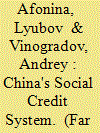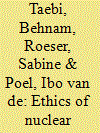| Srl | Item |
| 1 |
ID:
192512


|
|
|
|
|
| Summary/Abstract |
China's nationwide social credit system (also called social rating system) aims to collect and analyze data on companies and individuals to assess their economic and social influence, civic qualities, responsibility, and financial reliability. The digital deterrence system for regulating public life appears to be a continuation of the Chinese social experiments of the second half of the 20th century. This time, however, social engineering uses previously unknown technical means free from the disadvantages of subjective evaluation and application under set parameters. Digitalization has thus provided another tool for assessing social behavior - an additional control system based on strict mathematical principles and, importantly, unlike legal systems, operating in real time. In terms of its regulatory function, it is comparable to ethnical norms and morality.
|
|
|
|
|
|
|
|
|
|
|
|
|
|
|
|
| 2 |
ID:
116932


|
|
|
|
|
| Publication |
2012.
|
| Summary/Abstract |
In this paper we argue that traditional approaches to risk assessment should be supplemented by an explicit discussion of the moral acceptability of nuclear technology and the risks it poses. The introduction of nuclear energy in society should be seen as an ongoing social experiment, whose (moral) acceptability should continuously be addressed. Given the long-term risks of nuclear energy, intergenerational justice should be explicitly included in such an analysis. This will also have implications for nuclear power policies. Furthermore, emotions such as sympathy and feelings of responsibility can provide moral insights; they should be taken seriously in the debate about nuclear energy rather than being dismissed as irrational distractions as is currently the case. These proposed reforms would help society to move beyond the usual stalemate in the debate about nuclear power.
|
|
|
|
|
|
|
|
|
|
|
|
|
|
|
|